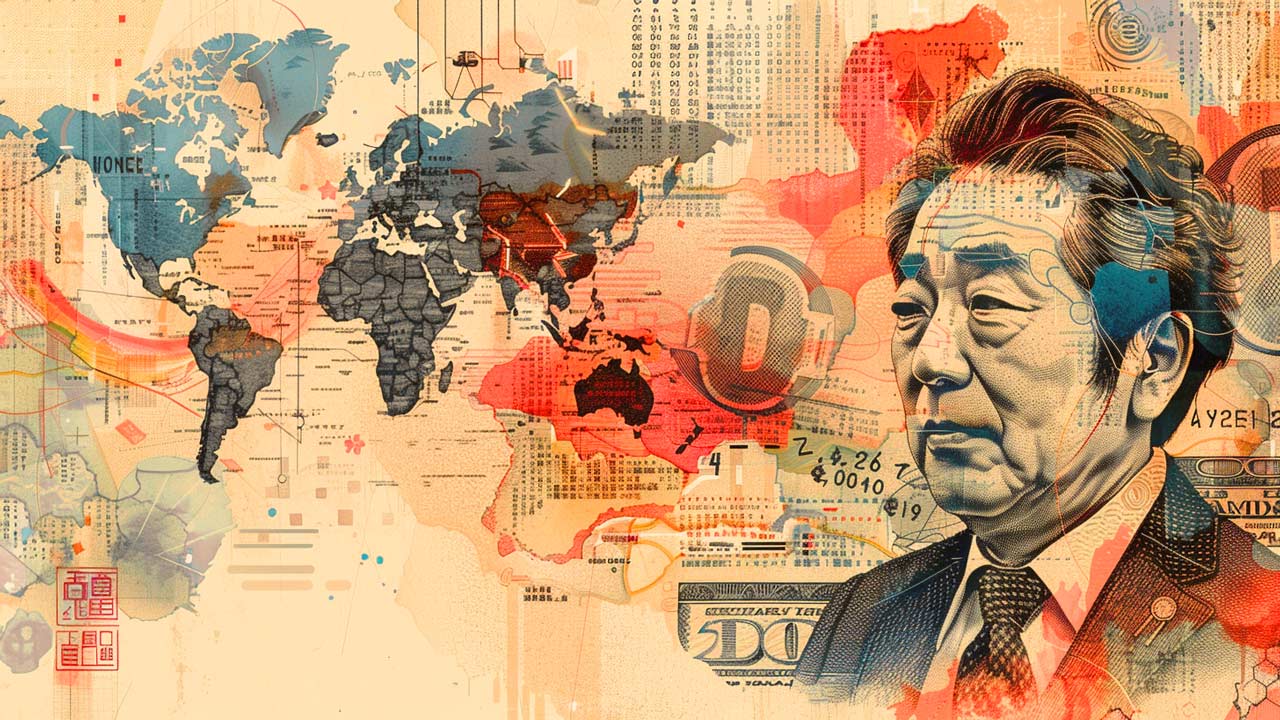We’re Living in an Economic Twilight Zone (Audio)
Peter Schiff is flabbergasted that the financial media is reporting China’s large trade surplus as a negative for its economy, while America’s huge trade deficit is portrayed as a positive. Both China’s surplus and America’s deficit are blamed on the same thing – a strong currency. After debunking this misinformation, Peter moves on to tear apart the concept that America is running out of college educated workers. Just because college graduates have a lower unemployment rate, doesn’t mean high schoolers should hurry to go into debt for a PhD in Philosophy.
Highlights from Peter’s podcast:
“Over the weekend, I’m reading these stories about China announcing a record monthly trade surplus in January… $60 billion surplus in one month. This is the best trade performance ever for China… $60 billion more of exports over imports. It’s like a record profit, a corporation reporting a record monthly profit…
“That is in the real world. But every day, my life more and more reminds me of a Twilight Zone episode… I’m reading all these articles about the China trade surplus, and I can’t find a single article that reports it as a good thing.
“Here is a typical example. I’ve got Reuters headline in front of me: ‘China’s Imports Slump, Capping Dismal January Trade Performance’. Dismal! A record surplus is considered dismal trade performance. Remember, last week America had its biggest monthly jump in its trade deficit in history… Nobody described that as dismal. In fact, most of the articles I read said it was a sign of the strength of the American consumer. The fact that we were able to run up such a big deficit…
“[Many blamed the American deficit on a strong dollar], but they’re also blaming China’s surplus on the strong yuan. Let me get this straight. America has a big trade deficit, because the strong dollar makes imports more attractive, so we import more. Yet the same thing happens in China, because the yuan is pegged to the dollar, and so China has a strong yuan, but it has an opposite effect in China. The strong yuan means that China’s surplus grows. How can that be? How can the same thing have opposite effects in two countries? It’s the Twilight Zone…
“Reuters points out that Chinese imports are down 19.9%, this January versus last January. This is supposed to be a bad thing. The main reason that imports are down, is because the price of the things that the Chinese buy have gone down. Chinese import a lot of oil. Well, oil is half-price… Unless they’re using twice as much oil, their import bill for oil is going to go down… And a lot of other commodity prices that the Chinese buy have gone down in price…
“The fact of the matter is, because of the strength of the yuan, the Chinese are able to buy more foreign products for fewer yuan. They buy more for less. That is good news. The fact that their trade surplus soared to a new high, that shows you how good the Chinese economy is doing.
“Yet every single major newspaper reported this record trade surplus as evidence of disaster in China. What is wrong with being able to buy more imports with less money? …
“This is all a sign of a strong Chinese economy, not a weak Chinese economy. But it also highlights the weakness of the US economy, because we have also enjoyed a stronger dollar. Yet despite the strength of the dollar, our trade deficit is getting bigger not smaller.
“The short-term effect of a strong currency is that your deficits go down or your surplus goes up, because it means you get to buy your imports for less. So because the dollar has strengthened, America’s trade deficit should actually be going down. The fact that it’s going up, despite the benefit of being able to buy our imports for less money just shows you how weak the US economy actually is…
“I’ve got another example to show you how the media spins everything. Either this is spin, or the reporters are just complete morons. It could be a combination of both… Here is a Bloomberg article that I first read and then I listened to this report that you can hear a clip from:
“[Bloomberg audio:] Here’s a story that caught our eye this morning. Last month, the unemployment rate for college graduates fell – get this – to 2.8%. Three points lower than the overall jobless rate, which means soon we could run out of college educated Americans to fill all the jobs that need filling. Can you believe that? [Other anchor:] I can. There’s been a steady drip of news about exactly that. About just how much better college – that truly is a stunning number as you pointed out. But the problem is, how do you pay for college? [End Bloomberg audio]
“Here is the title of the article: ‘Pretty Soon the US Might Run Out of College Educated Workers’. I’m thinking, how are we going to run out of them? We’ve got so many of them, what does this mean? Then the subtitle says, ‘The unemployment rate for bachelor’s degree holders is a at a six year low.’ The article points out that the unemployment rate for the overall population right now is 5.7%. But for people with college degrees, the unemployment rate is only 2.8%. This is the lowest since September 2008. So the conclusion of Victoria Stillwell, who is the person who wrote this… is that we’re going to run out of college grads… They’re getting so many jobs so quickly that… we better hurry up and put more high school kids through college. The moral of this is, ‘stay in school, kids.’…
“I don’t know whether this Victoria Stillwell is really just a complete moron or she’s just really trying to spin this thing… She’s trying to pretend that a college degree is so valuable. But she doesn’t bother to look beneath the surface… Why is the [college educated] unemployment rate so low? One of the reasons is that a lot of college grads are not actually looking for work… They couldn’t find a job, so they decided to go and get another degree… They’re not counted as being unemployed… Then there’s the college grads that just aren’t looking for work, period… There’s a lot of those kids out there…
“Here is the more important thing. Why are so few college grads unemployed, as opposed to, let’s say, guys that didn’t go to college? The author is trying to get you to believe that the reason these kids have jobs is because they have the degrees… The degree has nothing to do with it. The problem is that we have record numbers of people with college degrees who are in menial employment. They’re working for minimum wage. We have record numbers of college grads waiting tables, tending bar, driving taxi cabs, working at Wal-Mart, working at supermarkets. They’re doing jobs that don’t require the degrees that they have. That’s why there’s such a low rate of unemployment among college grads, because they’re cooking french fries. If you’ve got a PhD in Philosophy and you’re cooking french fries, you’re unemployed. Your degree hasn’t gotten you anywhere…
“Even if you work one hour a week, you’re not unemployed [according to the official data]… If you work at all, doing anything, then you’re not unemployed…”
Get Peter Schiff’s latest gold market analysis – click here – for a free subscription to his exclusive weekly email updates.
Interested in learning more about physical gold and silver?
Call 1-888-GOLD-160 and speak with a Precious Metals Specialist today!



 The monetary battle of the 20th century was gold vs. fiat. But the monetary battle of the 21st century will be gold vs. bitcoin. With Wall Street jumping into the game with bitcoin ETFs, a bitcoin halving recently splitting the block reward for miners in half, and both gold and bitcoin hovering near their all-time highs, it’s a great time for […]
The monetary battle of the 20th century was gold vs. fiat. But the monetary battle of the 21st century will be gold vs. bitcoin. With Wall Street jumping into the game with bitcoin ETFs, a bitcoin halving recently splitting the block reward for miners in half, and both gold and bitcoin hovering near their all-time highs, it’s a great time for […] What is Nvidia? If you’re a committed gamer the question may sound like nonsense. Nvidia, which was founded in 1993, is a tech company that makes GPUs and other products. It originally specialized in making products for the video game industry, that assisted in 3D rendering. If you were a committed gamer, you probably owned their products. If you weren’t, you might not have heard of them.
What is Nvidia? If you’re a committed gamer the question may sound like nonsense. Nvidia, which was founded in 1993, is a tech company that makes GPUs and other products. It originally specialized in making products for the video game industry, that assisted in 3D rendering. If you were a committed gamer, you probably owned their products. If you weren’t, you might not have heard of them. With the AI boom and green energy push fueling fresh copper demand, and with copper mines aging and not enough projects to match demand with supply, the forecasted copper shortage has finally arrived in earnest. Coupled with persistently high inflation in the US, EU, and elsewhere, I predict the industrial metal will surpass its 2022 top to reach a […]
With the AI boom and green energy push fueling fresh copper demand, and with copper mines aging and not enough projects to match demand with supply, the forecasted copper shortage has finally arrived in earnest. Coupled with persistently high inflation in the US, EU, and elsewhere, I predict the industrial metal will surpass its 2022 top to reach a […] America’s trust in its institutions has rapidly eroded over the past 20 years. We have a lower level of trust in our judicial system and elections than most European countries. Some of this is natural, as Americans are uniquely individualistic, but much of it arises from repeated government failures.
America’s trust in its institutions has rapidly eroded over the past 20 years. We have a lower level of trust in our judicial system and elections than most European countries. Some of this is natural, as Americans are uniquely individualistic, but much of it arises from repeated government failures. Decades of negative interest rate policy in Japan have ended. That could mean the end of the $20 trillion “yen carry trade,” once one of the most popular trades on foreign exchange markets, and a chain reaction in the global economy. The yen carry trade is when investors borrow yen to buy assets denominated in […]
Decades of negative interest rate policy in Japan have ended. That could mean the end of the $20 trillion “yen carry trade,” once one of the most popular trades on foreign exchange markets, and a chain reaction in the global economy. The yen carry trade is when investors borrow yen to buy assets denominated in […]
Leave a Reply